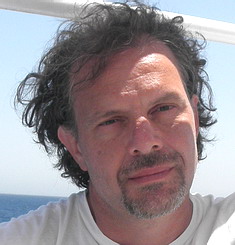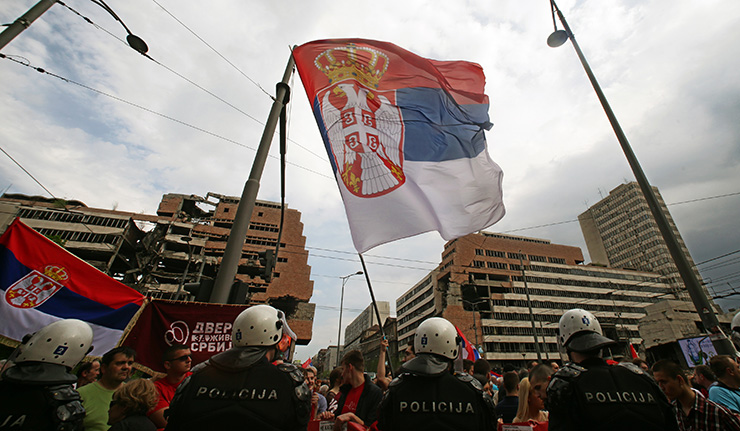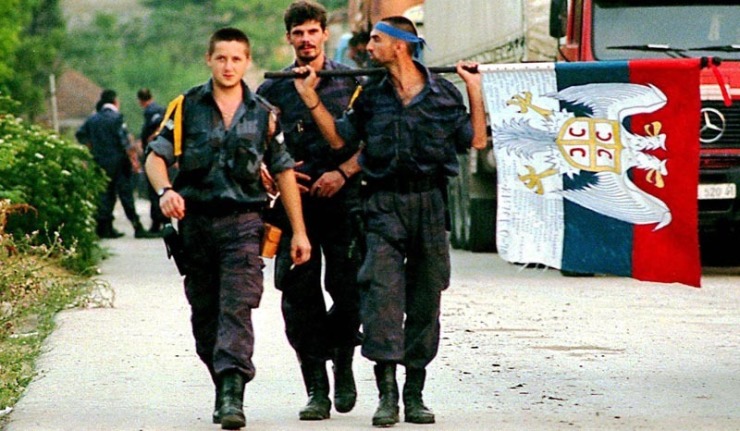
Aleksandar Pavic Political Analyst at the Strategic Culture Foundation
![]()

![]()
![]() Serbia: Breaking the Back of a Country's Identity - Part One
Serbia: Breaking the Back of a Country's Identity - Part One
![]() http://www.jar2.biz/Audio/Aleksandar_Pavic/10072013_Robles_Pavic_Part_01.MP3
Download audio file 10 October, 2013 16:17
http://www.jar2.biz/Audio/Aleksandar_Pavic/10072013_Robles_Pavic_Part_01.MP3
Download audio file 10 October, 2013 16:17

Recent attempts by the west to promote its values in Belgrade were met with violent resistance from the Serbian people. The promotion of western culture and "alternative morality" is another tool the West is using to break the moral and ethical spine of nations in order to facilitate occupation. Promoting behavior that goes against the accepted norms of a country is also part of an ongoing attempt being promoted by western corporate media to normalize the way of life alien to Serbia. Political commentator and analyst Aleksandar Pavic spoke with the Voice of Russia on these matters and more from Belgrade.
This is John Robles. You are listening to an interview with Aleksandar Pavic. He is a political analyst with the Strategic Culture Foundation.
Robles: Hello, Aleksandar. How are you this evening?
Pavic: I'm fine, thank you. Great to speak with you as well.
Robles: And it's great finally getting a hold of you as well. I'd like to ask you “a little bit” about your opinion and what the Serbian people think about this promotion of I don’t know what to call it “alternate lifestyles” by the West, to put it in a political correct manner I guess?
Pavic: Well, the majority of the people here are definitely against equalizing. As you put it- alternate lifestyles – we are talking about homosexuality in the first place..
Robles: Right we’re talking about equating…
Pavic: … making it into something mainstream here in Serbia..The problem in Serbia is that the people aren’t really being asked, let's say by the “political class”. They are having this thing practically shoved down their throats and imposed from the outside. All disguised as some sort of Europeanization, of joining the European Union, “brighter future, freedom, tolerance, liberty”, things like that.
Robles: Now, what do the Serbian people think about equating the relationship between two men to the same thing as marriage? I mean, for a lot of Russians, for the majority of Russians, that's something hard to swallow..
I mean a marriage is supposed to be to create children and it should be between two people of the opposite sex.
Pavic: Absolutely. Here the vast majority of people have very traditional view of marriage – it's between a man and a woman. People here aren't intolerant of someone being homosexual as long as it's a private thing. But people react when that is something that is turned into a public matter manifestation and a public promotion of that. And that's been a problem here ever since so-called 'democratic reforms' that came here to Serbia after the revolution in October of the year 2000.
So, in any case, the traditional marriage here is being viewed as something normal and desirable and anything else is not viewed as a legitimate marriage.
Robles: Right! You talked a minute ago, you mentioned 'being promoted from the outside'. Of course, we pretty much know who you were talking about, but could you specify?
Pavic: Yes, it's definitely coming from the West. More specifically – it's coming from western funded NGOs and they spend a lot of money to fund pressure groups here in Serbia. And the media who is also controlled by western states, in the first place the United States followed by Germany, those are two most active and influential states here, in a public domain. And they finance very well these pressure groups especially the so-called 'pro-gay' groups, the gay lobby here (the LGBT as they are called)/
Robles: They are used to be GLBT until the Ls protested that their rights were not being respected because they were women.
Pavic: Ok, we will accommodate them.
Robles: That's kind of ridiculous footnote, but anyway…
Pavic: All right, ok. Well, yeah, we will be very generous in that regard. If that's how they want to be called – that's fine.
In any case, it's obvious very well that it's being orchestrated from the outside not only because of the money that's coming in to the NGOs, but also because all the various western officials here especially the ambassadors of the western countries, the main western powers, meaning the EU countries, but again in the first place the United States, France, Great Britain, Germany, Holland, Norway, Denmark..The diplomats of those countries are very vociferous when it comes to supporting so-called gay rights and actually pressuring the Serbian government to allow gay parades being staged here in Belgrade. So in any case they are being very public about it, it's obvious where the pressure and the money are coming from. They are coming from the West.
Robles: What is the real reason, do you think, behind this push to try to force this behavior to be acceptable by the Serbian people? Why change the moral fiber of a country in your opinion? What are the hidden reasons for this?
Pavic: Once you break a country's back, once you break its moral and ethical spine, pretty much, you can occupy it with no problem.
When Ottoman Empire, the the Turks came to the Balkans in the late 14th century, beginning of the 15th century, the attack was first of all on the state, but afterwards there was the attack on the Church. Because the Church was the carrier of the moral values and it's the same thing today.
Even where the Church is not, even among non-believers, agnostics or people who don't go to church very often, they still have a moral code, they picked it from home.
I think the reasoning is from the outside is if you really want break any sort of resistance to any foreign occupation of any sort, whether it's military, economic, cultural, you have to break the back of the country's identity. And I think, that's the main goal here.
The second goal, I think, that is something that's a global phenomenon. It's really forcing evil to become something common place: the negative to be equated with the positive, relativization of all moral values. And that's a global phenomenon, which is being pushed through all the global corporate media.
Robles: That's a very good point, you just raised, about evil becoming common place. I was talking to somebody the last… a couple of weeks ago about the events in Syria and we were discussing the killing of these 426 children as a pretext for war, like it was a normal event almost. And I stopped for a minute and it was quite disgusting really.
Pavic: Absolutely. The more I watch today's news and the agenda, the words of Hannah Arendt are always resumed - the banality of evil.
Evil has been banalized beyond all recognition it's almost becoming..they are trying to make it completely common place and something that has… Is not less good than anything else. It's a democratic choice you make : good, evil. It's not important whether something is good of evil, but you have the freedom to make that choice.
Robles: I see.
Just remind you, you are listening to an interview with Aleksandar Pavic.
Robles: In what other ways do you think the West is engaged in breaking the Serbian people's identity, if you could? This is just one instrument they use we know of that.
Pavic: The other, of course, main pathway is Kosovo, the attack on Kosovo. It's not just an attack on the territorial integrity of the country, it's also an attack on the very identity of Serbs, it’s what made Serbs survive.
For several centuries of mostly Islamic occupation. Kosovo is a place which probably has the biggest concentration of sacral objects, sacral buildings anywhere in Europe, meaning churches, more than a thousand churches dot this very small territory. And pretty much since western troops arrived in Kosovo in 1999 more that 150 churches have been destroyed. And dozens and dozens of cemeteries, old archeological sides, it's all being systematically wiped away one by one.
So Kosovo is something that people in Serbia very much identify with. And taking it away, not only physically, but also in the sense that's trying to convince the Serbs, that Kosovo is actually Albanian and it doesn't belong to them. That's the other main point of attack on the Serbian identity.
![]() 'The West, like the Third Reich, Decided Serbia was the Problem' - Part Two
'The West, like the Third Reich, Decided Serbia was the Problem' - Part Two
![]() http://www.jar2.biz/Audio/Aleksandar_Pavic/10072013_Robles_Pavic_Part_02.MP3
Download audio file 11 October, 2013 17:39
http://www.jar2.biz/Audio/Aleksandar_Pavic/10072013_Robles_Pavic_Part_02.MP3
Download audio file 11 October, 2013 17:39

Divide and conquer, one of the oldest strategies in the world, is being applied over and over by the West in their endless campaign of global domination. Such a strategy has absolutely nothing to do with democracy or humanitarian ideals, it has to do with the defragmentation and the destruction of your enemy. Because Serbia had a strong national identity and was seen as an ally of Russia, Serbia was deemed to be the problem in the Balkans. Serbians do not accept the independence of Kosovo and the elected leaders know that which ultimately leads to a “schizophrenic” situation in Serbia. In an interview with the Voice of Russia, Aleksandar Pavic spoke on these issues and more.
Robles: We know the West; right after the troops moved in 1999, and right after they recognized the “supposed” independence of the sovereign part of Serbia, they proceeded with instantly building the largest military base outside of the United States. Do you think it's possible that had the Serbian Government, at that time allowed for this base to be built, that things would have gone the other way?
Pavic: It's possible, but we have the testimony of government officials during Milosevic's time, meaning during the ‘90s, some of that was testimony (very recent), including the current Prime Minister of Serbia, who is now very cooperative, regarding vis-à-vis, the West but was a close associate of Milosevic during ‘90s. And he and the former president, who stood trial in the Hague; this is Milan Milutinovic, they said, that actually Serbia (Yugoslavia at that time of Milosevic), they offered to the West, both back in ‘93 and then again in ’98, that they were willing to even consider NATO membership in return for and end of sanctions, or in ’98, to avoid bombing. But they didn't receive any sort of response.
Meaning that probably, just as the Germans judged before World War II and World War I, the Serbian nation itself is the problem here. It's the only nation along with the Greeks in this part of Europe which has its own strong national identity and its own national vision and very strong feelings for national sovereignty. And they probably think, that this is not good material for a satellite state.
So what they did; they just made alliances, they broke up Yugoslavia into very small pieces and then they made little satellite states, with which they encircled Serbia. And I think, they figured out just as the Third Reich did back in 1940 and 1941, that that was really the best way to control Serbia and anything else would be much less reliable. So I don't think they really counted on the Serbs as being reliable allies.
Robles: I think you missed another very important point, because Serbia was the only country, and is, in that part of the world, that is allied with Russia. And we've seen that with Syria and every other country that allies with Russia, is demonized by the West.
Pavic: Absolutely. We are well aware of the fact here that the West, at least 150 years or so, especially British policy has always been to keep Russia away from the warm seas, and Serbia ever since it regained its freedom in the early 19th century from Turkey, has always been seen as an exponent of Russia, as a passage way of Russia to reach, reaching, the warm Mediterranean seas. And so, as a result, Serbia just can not be trusted by the West, because it's always seen as a potential Russian outpost in this part of the world. You are absolutely right in underlining that.
Robles: What is the current political climate there in Serbia? I've done quite a few interviews regarding European, quote un-quote” integration” etc. and the population, for the most part, being against allowing any recognition of Kosovo's independence, but then the government doing whatever it seems they want… What's the current situation with the people, with the government, and how do you see thing going in the near and far future?
Pavic: The situation is a little bit more complicated than it was, let’s say more than a year… a year and a half ago. A year and a half ago, in May 2012 we had Parliamentary and Presidential Elections, and the extremely pro-western government of Boris Tadic and his presidential administration were voted out of office, and people voted for the current president Nikolic, and the plurality of the people voted for the so-called “Progressive Party”, which has the most seats in Parliament and today is the strongest among the governing coalition here in Belgrade.
But the program they ran on was not the program they are executing now. Actually instead the Progressive Party along with their Socialist Party minority allies, they have actually taken Tadic's program and made it even more radically pro-western.
They completely, completely misrepresented their Kosovo policy. Now they are doing… they have gone at least not one, but three steps farther than Tadic in pushing Kosovo away from Serbia.
So in fact, the current government, although seemingly popular if you believe the opinion polls, which are traditionally unreliable here, and tight media control, it would seem like the government is popular. But this is not what people voted for in May 2012.
What they actually voted for was to slow down on the so-called European integration if that meant having to give up on Kosovo, and also people voted to… for closer relations with Russia, because many people forget, or maybe they don't know, but the Progressive Party, the party of Nikolic and Vucic who is the first Vice President of the current government, their election meetings, their election gatherings, at several of their big election gatherings the Russian Ambassador in Belgrade attended and he always receives standing ovations. And people were made to believe that they were voting for a pro-Russian Party, for a party that would bring Serbia and Russia closer together. Instead they got practically the opposite. So in that sense, we have a very schizophrenic situation here in Serbia.
Robles: I see. Is there any backlash growing out of this or is there anything come out of that, or are they just going to keep steam rolling in whatever they want to do?
Pavic: Well the point is the backlash, there is, but it's very unorganized. Because practically this was; the current government and the Progressive Party especially, they were supposed to be the main opposition, but now they’ve taken… they’ve came to power, and they are more pro-western than the party that was voted out of office.
Really right now Serbia doesn't have an organized opposition, because the so-called “opposition” in fact turned out to be like cuckoo’s egg. So as a result and with the media being so well controlled, with the political process being so well controlled, the challenge here is to organize a real political opposition to the current regime.
You were listening to an interview with Aleksandar Pavic. He is a political analyst with the Strategic Culture Foundation Online Journal. Thank you very much for listening and I wish you the best wherever in the world you may be.
![]() Part 3 Was Never Published and No Transcript Exists
Part 3 Was Never Published and No Transcript Exists
![]() http://www.jar2.biz/Audio/Aleksandar_Pavic/10072013_Robles_Pavic_Part_03.MP3
http://www.jar2.biz/Audio/Aleksandar_Pavic/10072013_Robles_Pavic_Part_03.MP3
![]()

![]()
![]()
![]()
![]() The Republic of
Serbia
The Republic of
Serbia
http://www.jar2.com/Topics/Serbia.html
![]()
![]()
![]()
![]() International Crimes of the US/NATO/Israel/Saudi Arabia -
NWO
International Crimes of the US/NATO/Israel/Saudi Arabia -
NWO
http://www.jar2.com/Topics/US_International_Crimes.html
![]()
![]()
![]()
![]() The Truth About NATO
The Truth About NATO
![]()
Last Update: 09/14/2023 22:59 +0300
Please help keep us going and make a donation Thanks to all supporters! PayPal, Сбербанк Sberbank Visa 4276 3800 4476 1661 Copyright JAR2 2003-2103 All Rights Reserved Publishing Banned Truth Since June 06, 2003
|














.jpg)



